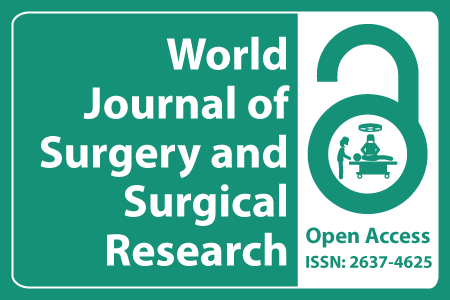
Journal Basic Info
- Impact Factor: 1.989**
- H-Index: 6
- ISSN: 2637-4625
- DOI: 10.25107/2637-4625
Major Scope
- Podiatric Surgery
- Surgery & Surgical Research
- Surgical Oncology
- Robotic Surgery
- Breast Surgery
- Orthopaedic Surgery
- Colorectal Surgery
- Transplant Surgery
Abstract
Citation: World J Surg Surg Res. 2023;6(1):1490.DOI: 10.25107/2637-4625.1490
Treatment for Endoscopic Pilonidal Sinuses in Conjunction with the Application of Crystallized Phenol may Prevent Recurrence
Malathi T, Praveen MK and Surendra MK
Department of Pharmacology, Senghundhar College of Pharmacy, India
*Correspondance to: Malathi Thiyagarajan
PDF Full Text Research Article | Open Access
Abstract:
A frequent condition of the natal cleft is the pilonidal sinus, can cause consequences of various issues including infection and development of an abscess. The purpose of this review paper is to investigate if endoscopic pilonidal sinus therapy in conjunction with application of crystalized phenol can prevent recurrence. There are several operative management alternatives, however the best method is still up for debate. There is currently no single treatment available for pilonidal diseases, which heals quickly and rarely returns. There is currently no one treatment for pilonidal illness that is quick to heal, produces pleasing aesthetic effects, and has a low recurrence rate. For the first time, this cohort combined the pilonidal illness treatments of phenol crystal application and diathermy ablation using an endoscope.
The use of endoscopic pilonidal sinus surgery in conjunction with crystalized phenol for the treatment of pilonidal disease: Its safety, efficacy, and short- and long-term results. Phenolization appears to have advantages over local sinus excision due to the fact that it is carried out under local anesthesia with a relatively short surgical procedure, less postoperative discomfort, a low risk of surgical site infection (8.7%), and a short recovery period (mean of 2.3 days) from normal activity.
Keywords:
Phenol; Pilonidal disease; Sinus excision; Endoscopic; Abscess
Cite the Article:
Malathi T, Praveen MK, Surendra MK. Treatment for Endoscopic Pilonidal Sinuses in Conjunction with the Application of Crystallized Phenol may Prevent Recurrence. World J Surg Surgical Res. 2023; 6: 1490..













